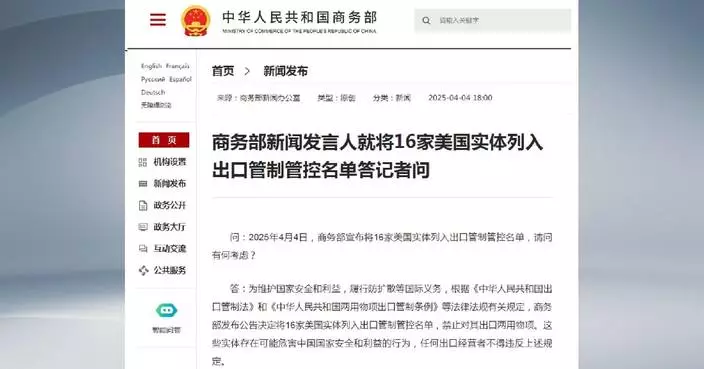It wasn't just fact-checking that Meta scrapped from its platforms as it prepares for the second Trump administration. The social media giant has also loosened its rules around hate speech and abuse — again following the lead of Elon Musk's X — specifically when it comes to sexual orientation and gender identity as well as immigration status.
The changes are worrying advocates for vulnerable groups, who say Meta's decision to scale back content moderation could lead to real-word harms. Meta CEO Mark Zuckerberg said Tuesday that the company will “remove restrictions on topics like immigration and gender that are out of touch with mainstream discourse," citing “recent elections” as a catalyst.
For instance, Meta has added the following to its rules — called community standards — that users are asked to abide by:
“We do allow allegations of mental illness or abnormality when based on gender or sexual orientation, given political and religious discourse about transgenderism and homosexuality and common non-serious usage of words like ‘weird.’” In other words, it is now permitted to call gay people mentally ill on Facebook, Threads and Instagram. Other slurs and what Meta calls “harmful stereotypes historically linked to intimidation” — such as Blackface and Holocaust denial — are still prohibited.
The Menlo Park, California-based company also removed a sentence from its “policy rationale” explaining why it bans certain hateful conduct. The now-deleted sentence said that hate speech “creates an environment of intimidation and exclusion, and in some cases may promote offline violence.”
“The policy change is a tactic to earn favor with the incoming administration while also reducing business costs related to content moderation,” said Ben Leiner, a lecturer at the University of Virginia’s Darden School of Business who studies political and technology trends. “This decision will lead to real-world harm, not only in the United States where there has been an uptick in hate speech and disinformation on social media platforms, but also abroad where disinformation on Facebook has accelerated ethnic conflict in places like Myanmar.”
Meta, in fact, acknowledged in 2018 that it didn't do enough to prevent its platform from being used to “incite offline violence” in Myanmar, fueling communal hatred and violence against the country’s Muslim Rohingya minority.
Arturo Béjar, a former engineering director at Meta known for his expertise on curbing online harassment, said while most of the attention has gone to the company's fact-checking announcement Tuesday, he is more worried about the changes to Meta's harmful content policies.
That's because instead of proactively enforcing rules against things like self-harm, bullying and harassment, Meta will now rely on user reports before it takes any action. The company said it plans to focus its automated systems on “tackling illegal and high-severity violations, like terrorism, child sexual exploitation, drugs, fraud and scams.”
Béjar said that's even though “Meta knows that by the time a report is submitted and reviewed the content will have done most of its harm.”
“I shudder to think what these changes will mean for our youth, Meta is abdicating their responsibility to safety, and we won’t know the impact of these changes because Meta refuses to be transparent about the harms teenagers experience, and they go to extraordinary lengths to dilute or stop legislation that could help,” he said.
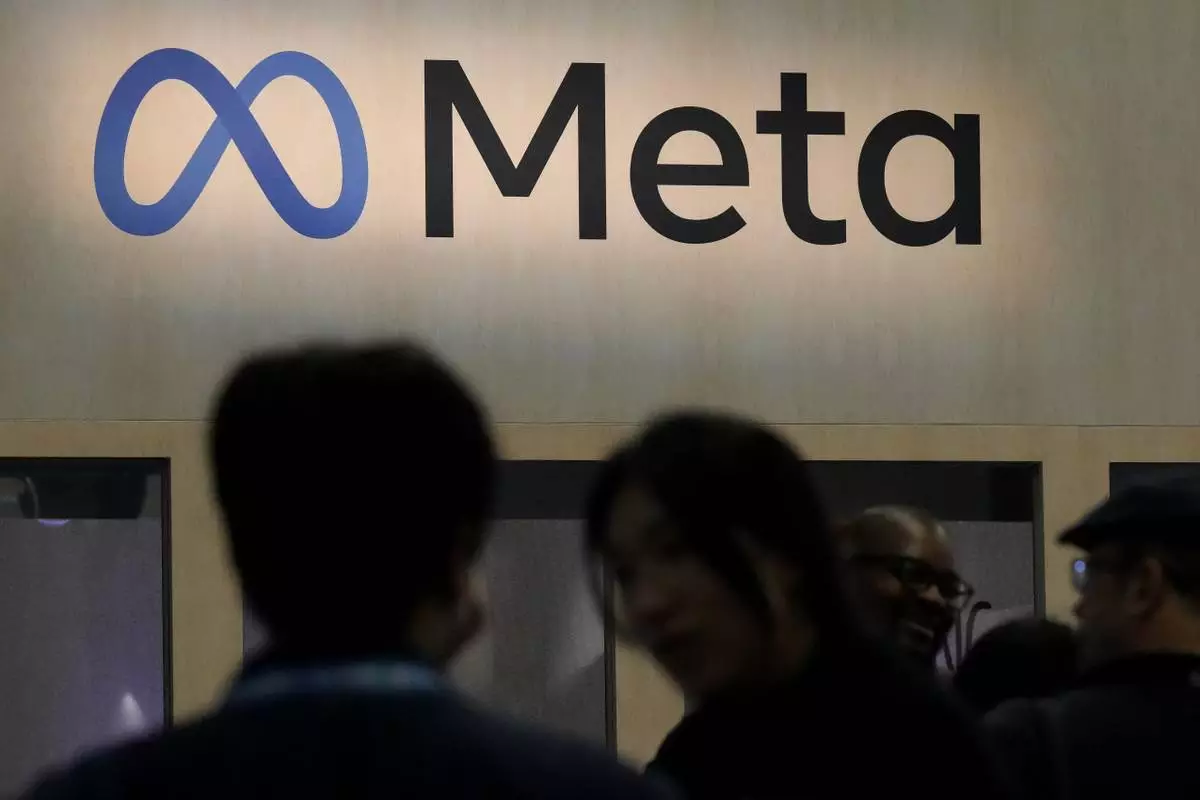
FILE - Attendees visit the Meta booth at the Game Developers Conference in San Francisco on March 22, 2023. (AP Photo/Jeff Chiu, File)
WASHINGTON (AP) — As stock markets tumble in the aftermath of President Donald Trump's sweeping tariffs, Republicans in Congress were watching with unease and talking of clawing back their power to levy tariffs — but almost none seemed ready to turn their words into action.
The Republican president is upending longstanding GOP principles like support for free trade, yet despite clear misgivings and a Constitutional mandate to decide tariffs, most lawmakers were not ready to cross Trump. Instead, they were focusing all their attention on advancing the president's " big, beautiful bill ” of tax breaks and spending cuts, even as tariffs — in essence, import taxes — threatened to raise consumer prices across the board and push the global economy into a recession.
As the fallout from Trump's announcement reverberated around global markets, Senate Majority Leader John Thune, who has made it clear he is no fan of tariffs, told reporters that he would give Trump "the benefit of the doubt” in hopes that the announcement was just a scare tactic to prod foreign leaders into negotiating better trade deals with the U.S.
“The president is a dealmaker if nothing else, and he's going to continue to deal country by country with each of them,” said Sen. John Barrasso, a Wyoming Republican who is no. 2 in GOP Senate leadership. He added that Treasury Secretary Scott Bessent had told Senate Republicans this week that the tariffs announced by Trump would be a “high level mark with the ultimate goal of getting them reduced” unless other countries retaliate.
But countries like China are already retaliating with tariffs of their own, and while the president has signaled he is open to negotiations, he was mostly sounding a defiant tone Friday, saying on social media that “MY POLICIES WILL NEVER CHANGE” while claiming that foreign investors were lining up to invest in U.S. industries. He was on the golf course Friday near his Mar-a-Lago private club in Florida.
Congress, however, was jittery.
A handful of Republicans have rebuked Trump's strategy as a foolhardy path that will burden U.S. households. Kentucky Sen. Mitch McConnell, the longtime Senate leader who was the standard-bearer for past generations of Republicans, released a lengthy statement saying, “As I have always warned, tariffs are bad policy, and trade wars with our partners hurt working people most.”
McConnell and three other Republicans joined with Democrats this week to help pass a resolution that would nullify Trump's tariffs on Canada, sending a rebuke to the president just hours after his “Liberation Day” announcement. But House Speaker Mike Johnson quickly indicated he has no interest in giving the resolution a vote.
Lawmakers' struggle to act showed the divide among Republicans on trade policy, with a mostly younger group of Republicans fiercely backing Trump's strategy. Rather than heed traditional free trade doctrine, they argue for “America First” protectionism and hope it will revive U.S. manufacturing.
Republican Sen. Josh Hawley said that workers in his home state of Missouri were “absolutely thrilled” with the tariffs. “We've been losing jobs left and right. Farmers want to see a fair deal for our products, both in Canada and in Mexico and from the (European Union)," he added.
For their part, Democrats slammed Trump's tariffs as a reckless maneuver meant to do nothing more than raise funds for the tax breaks Trump and Republicans are trying to pass.
“Why would he raise the costs on American families by $5,000, as it’s estimated? Simply because his very wealthy billionaire friends want a greater tax break,” Senate Democratic Leader Chuck Schumer said in a floor speech Friday.
Other Democrats challenged more Republicans to stand up to Trump. “If they truly believe in capitalism, they need to put their votes where capitalism is and that is that competition works, our world relationships work,” said Sen. Amy Klobuchar, D-Minn., at a news conference.
“Donald Trump is taking us backwards to the Great Depression,” she added.
Sen. Rand Paul, a Kentucky Republican who holds libertarian economic views, has been highly critical of the tariffs, warning they create the same economic problems that exacerbated the Great Depression. He is calling for Congress to reject Trump's plans with legislation that would require congressional approval for taxes on imports.
Other Republicans were looking for roundabout ways to check the president's power on trade policy. Sen. Chuck Grassley, a senior Republican from Iowa, introduced a bipartisan bill Thursday that would require presidents to justify new tariffs to Congress. Lawmakers would then have to approve the tariffs within 60 days, or they would expire.
Although Grassley emphasized that he had long been working on the idea, the timing of the bill was notable. It gave Republicans a chance to talk about their distaste for import taxes and raised the prospect of Congress clawing back some of its power over tariffs. The Constitution gives Congress the responsibility of setting taxes and tariffs, but over the last century, lawmakers have ceded much of their power over import taxes to the president.
A handful of Republicans said they were favorable to Grassley's proposal, though the idea of directly defying Trump seemed to squelch potential for quick action.
“I don’t want to do it in a politically charged environment,” said Sen. Mike Rounds, a South Dakota Republican. “But I absolutely agree. This was set up by the Founding Fathers to be Congress’s role. And, I think we’re way past the point of what the Founding Fathers ever wanted to have happen."
Democratic Sen. Brian Schatz seized on the hesitation from Republicans, saying on social media Friday that the Senate would overwhelmingly repeal or constrain tariff authority “if every Senator voted their conscience and their state’s interest.”
“Mostly everyone hates this, they are just too afraid of the Mad King at the moment,” Schatz added.
Sen. John Kennedy, a Louisiana Republican, also predicted the bill would never pass “because of the voting requirements in the Senate.”
But he was still taking to social media to offer a folksy bit of advice: “Tariffs are like whiskey: A little whiskey, under the right circumstances, can be refreshing — but too much whiskey, under the wrong circumstances, can make you drunk as a goat.”
Associated Press writer Kevin Freking contributed
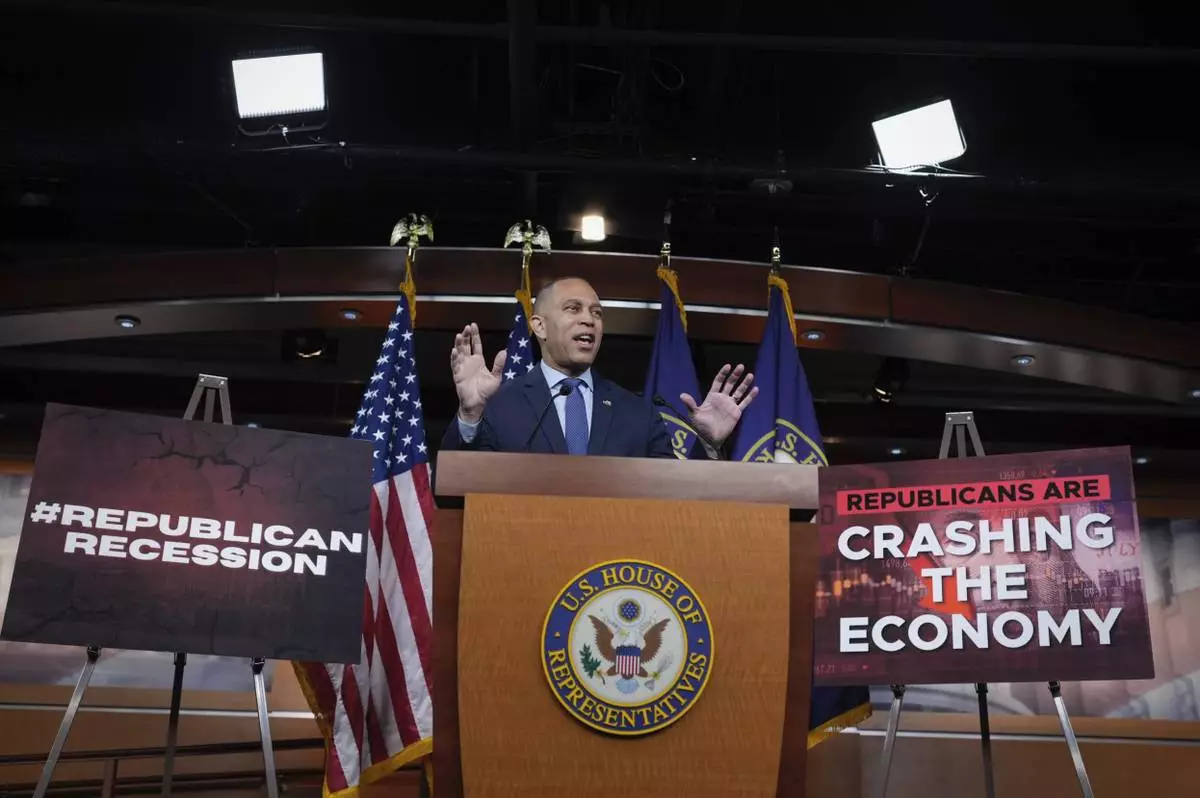
House Minority Leader Hakeem Jeffries, D-N.Y., criticizes the agenda of President Donald Trump and the tactics of billionaire Elon Musk in a pivotal Wisconsin election where Democrats won, during a news conference at the Capitol, in Washington, Wednesday, April 2, 2025. (AP Photo/J. Scott Applewhite)

Senate Minority Leader Chuck Schumer, D-N.Y., attends a news conference discussing the Republican-backed budget plan at the Capitol, in Washington, Thursday, April 3, 2025. (AP Photo/J. Scott Applewhite)
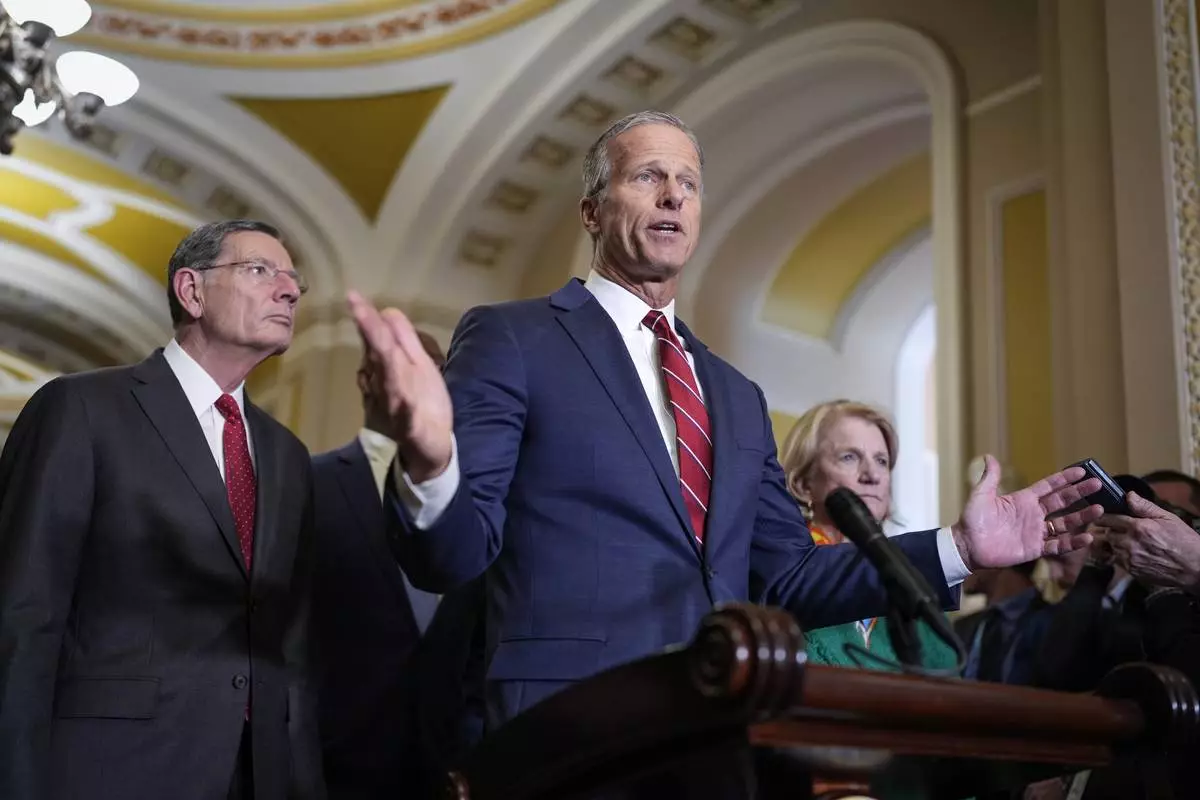
Senate Majority Leader John Thune, R-S.D., joined by Sen. John Barrasso, R-Wyo., the GOP whip, left, talks to reporters ahead of announcements by President Donald Trump on tariffs, at the Capitol, in Washington, Tuesday, April 1, 2025. (AP Photo/J. Scott Applewhite)

Speaker of the House Mike Johnson, R-La., talks with reporters as he arrives for a closed-door strategy session with fellow Republicans ahead of announcements by President Donald Trump on tariffs, at the Capitol, in Washington, Tuesday, April 1, 2025. (AP Photo/J. Scott Applewhite)
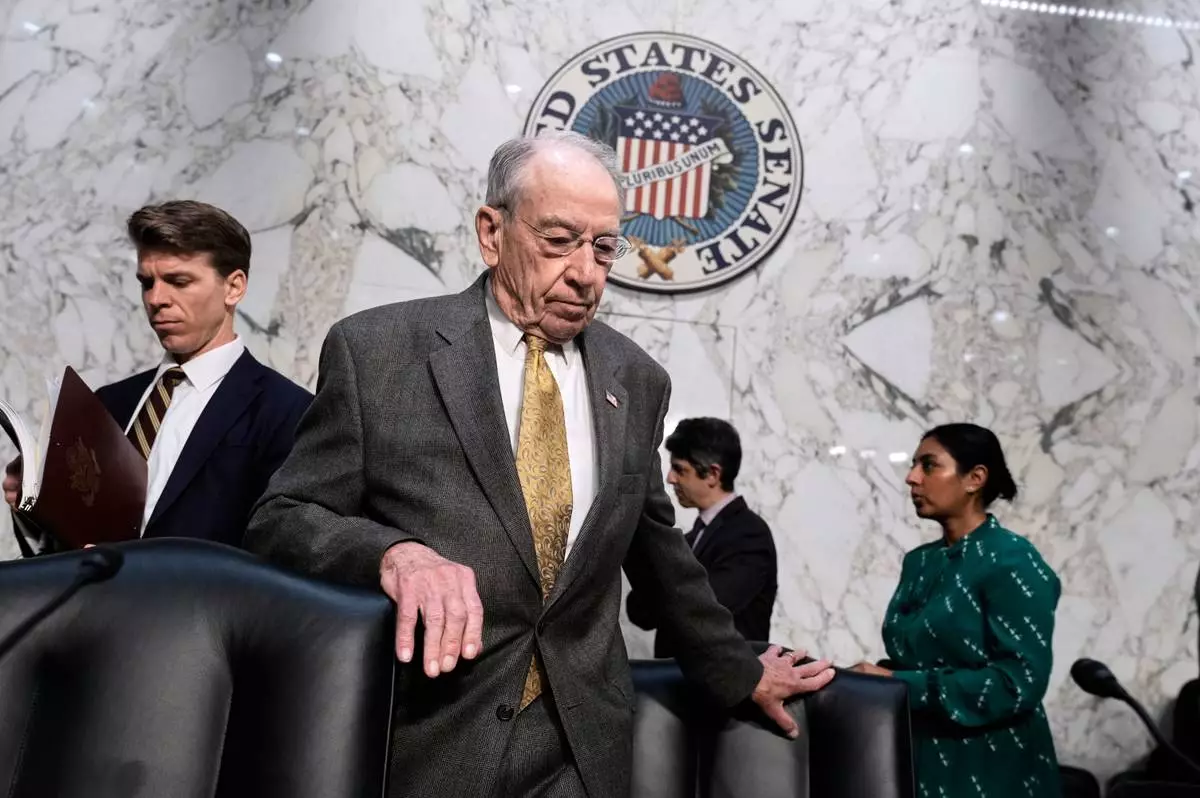
Senate Judiciary Committee Chairman Chuck Grassley, R- Iowa, takes his seat as the panel meets to consider prescription drug pricing and other measures, at the Capitol in Washington, Thursday, April 3, 2025. (AP Photo/J. Scott Applewhite)






























